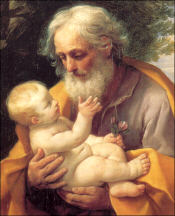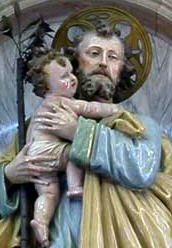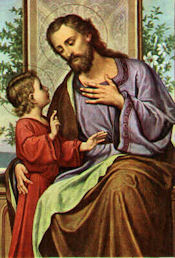Month of St. Joseph
The month of March (Overview - Calendar) is dedicated to St. Joseph. We don't know much about him except what is mentioned in the Gospels. Joseph was the husband of the Blessed Virgin Mary and the foster-father of Jesus. Holy Scripture proclaims him as a "just man," and the Church has turned to Joseph for his patronage and protection. Pope Leo XIII in his encyclical Quamquam Pluries (On the Devotion to St. Joseph) in 1889 explains why we place so much trust in this saint:
 "Thus in giving Joseph the Blessed Virgin as spouse, God appointed him to be not only her life's companion, the witness of her maidenhood, the protector of her honor, but also, by virtue of the conjugal tie, a participator in her sublime dignity. And Joseph shines among all mankind by the most august dignity, since by divine will, he was the guardian of the Son of God and reputed as His father among men. Hence it came about that the Word of God was humbly subject to Joseph, that He obeyed him, and that He rendered to him all those offices that children are bound to render to their parents. From this two-fold dignity flowed the obligation which nature lays upon the head of families, so that Joseph became the guardian, the administrator, and the legal defender of the divine house whose chief he was. And during the whole course of his life he fulfilled those charges and those duties. ...It is, then, natural and worthy that as the Blessed Joseph ministered to all the needs of the family at Nazareth and girt it about with his protection, he should now cover with the cloak of his heavenly patronage and defend the Church of Jesus Christ."
"Thus in giving Joseph the Blessed Virgin as spouse, God appointed him to be not only her life's companion, the witness of her maidenhood, the protector of her honor, but also, by virtue of the conjugal tie, a participator in her sublime dignity. And Joseph shines among all mankind by the most august dignity, since by divine will, he was the guardian of the Son of God and reputed as His father among men. Hence it came about that the Word of God was humbly subject to Joseph, that He obeyed him, and that He rendered to him all those offices that children are bound to render to their parents. From this two-fold dignity flowed the obligation which nature lays upon the head of families, so that Joseph became the guardian, the administrator, and the legal defender of the divine house whose chief he was. And during the whole course of his life he fulfilled those charges and those duties. ...It is, then, natural and worthy that as the Blessed Joseph ministered to all the needs of the family at Nazareth and girt it about with his protection, he should now cover with the cloak of his heavenly patronage and defend the Church of Jesus Christ."
One hundred years later John Paul II echoes his predecessor in his 1989 Apostolic Exhortation Redemptoris Custos (Guardian of the Redemeemer), hoping "that all may grow in devotion to the Patron of the Universal Church and in love for the Savior whom he served in such an exemplary manner ... In this way the whole Christian people not only will turn to St. Joseph with greater fervor and invoke his patronage with trust, but also will always keep before their eyes his humble, mature way of serving and of "taking part" in the plan of salvation." St. Joseph is invoked as patron for many causes. He is the patron of the Universal Church. He is the patron of the dying because Jesus and Mary were at his death-bed. He is also the patron of fathers, of carpenters, and of social justice. Many religious orders and communities are placed under his patronage.— Jennifer Gregory Miller
 The Church encourages us to be devoted to Joseph because he was a model in the heroic practice of all the virtues. The example of virtuous living that he gave in the exact fulfillment of the duties of his state of life is worthy of our reflection. Read the gospel and you will see his faith, hope and charity practiced under trying circumstances. He was prudent in caring for his wife and the child; he showed great leadership in protecting them and assisting them. He was religious in every sense, with that delicacy and sincerity of conscience that is proper to the saints of God. He was just in his dealings with God and man. He was conspicuous for his fortitude and courage. He was truly outstanding in the practice of virginal chastity. More: he protected and defended Mary's virtue in the time of courtship and all during their life together. They had made a promise of chastity, and because they were resolved to live it for God they were blessed above all others. While Mary inspired him to practice this virtue perfectly, he, as a real man, understood the profound meaning of her inspiration and how it came from a heart that was steeped in the love of God. Time and again the Church has made it clear that Joseph is not a saint for only a certain number of souls, but that he can help all men. Excepted from St. Joseph: a Theological Introduction by Michael D. Griffin, O.C.D.
The Church encourages us to be devoted to Joseph because he was a model in the heroic practice of all the virtues. The example of virtuous living that he gave in the exact fulfillment of the duties of his state of life is worthy of our reflection. Read the gospel and you will see his faith, hope and charity practiced under trying circumstances. He was prudent in caring for his wife and the child; he showed great leadership in protecting them and assisting them. He was religious in every sense, with that delicacy and sincerity of conscience that is proper to the saints of God. He was just in his dealings with God and man. He was conspicuous for his fortitude and courage. He was truly outstanding in the practice of virginal chastity. More: he protected and defended Mary's virtue in the time of courtship and all during their life together. They had made a promise of chastity, and because they were resolved to live it for God they were blessed above all others. While Mary inspired him to practice this virtue perfectly, he, as a real man, understood the profound meaning of her inspiration and how it came from a heart that was steeped in the love of God. Time and again the Church has made it clear that Joseph is not a saint for only a certain number of souls, but that he can help all men. Excepted from St. Joseph: a Theological Introduction by Michael D. Griffin, O.C.D.
 St. Joseph plays a prominent part in popular devotion: in numerous popular traditions; the custom of reserving Wednesdays for devotion to St. Joseph — popular at least since the end of the seventeenth century — has generated several pious exercises including that of the Seven Wednesdays; in the pious aspirations made by the faithful; in prayers such as that of Pope Leo XIII, Ad te, Beate Ioseph, which is daily recited by the faithful; in the Litany of St. Joseph, approved by St. Pope Pius X; and in the recitation of the Chaplet of St. Joseph, recollecting the Seven agonies and seven joys of St. Joseph.
St. Joseph plays a prominent part in popular devotion: in numerous popular traditions; the custom of reserving Wednesdays for devotion to St. Joseph — popular at least since the end of the seventeenth century — has generated several pious exercises including that of the Seven Wednesdays; in the pious aspirations made by the faithful; in prayers such as that of Pope Leo XIII, Ad te, Beate Ioseph, which is daily recited by the faithful; in the Litany of St. Joseph, approved by St. Pope Pius X; and in the recitation of the Chaplet of St. Joseph, recollecting the Seven agonies and seven joys of St. Joseph.
That the solemnity of St. Joseph falls in Lent, when the Church concentrates her attention on preparation for Baptism and the memorial of the Lord's Passion, inevitably gives rise to an attempt to harmonize the Liturgy and popular piety. Hence, the traditional practices of a "month of St. Joseph" should be synchronized with the liturgical Year. Indeed, the liturgical renewal movement attempted to instill among the faithful a realization of the importance of the meaning of Lent. Where the necessary adaptations can be made to the various expressions of popular piety, devotion to St. Joseph should naturally be encouraged among the faithful who should be constantly reminded of the "singular example [...] which, surpassing all states of life, should be recommended to the entire Christian community, whatever their condition or rank."
— Directory on Popular Piety and the Liturgy
 In the litany of St. Joseph, we say, �St. Joseph, Head of the Holy Family, pray for us.� There is more hidden behind this invocation than meets the eye. We know, of course, that Mary is the Virgin Mother of Jesus Christ. We know that the Savior was not conceived of a human father. Yet the Church has never tired insisting on the fatherhood of St. Joseph in the Holy Family. It is crucially important to understand that there are two levels to fatherhood. There is the physical level of providing for the conception of a human body. In this sense, Christ did not have a human father. But a father is not only to cooperate with his wife in generating a child. He is also to cooperate with her in rearing the offspring which his spouse brings into the world. From all eternity, Joseph was destined to be the spouse of the Blessed Virgin. They were truly married. Joseph was Mary�s husband, and she was his wife. Marriage is the most intimate of all unions between two human beings. It imparts a community of gifts between those joined together in matrimony. Consequently, in giving Joseph the Blessed Virgin as his spouse, God appointed him to be not only her life�s companion, but also the witness of her virginity, the protector of her honor. No, by reason of his conjugal tie to Mary, he participated in her sublime dignity. We cannot exaggerate the importance of seeing St. Joseph as the true spouse of Mary. Under God, he was to share in her unique role as Mother of the Word made flesh who dwelt among us. St. Luke tells us that, on returning to Nazareth after Mary and Joseph found the young Christ in the temple, �Jesus advanced in wisdom and age and grace before God and men (Luke 2:52)�. What are we being told? We are being told that the Christ child constantly manifested greater wisdom as he grew in age. In God�s mysterious providence, both Mary and Joseph contributed to this manifestation of greater wisdom in Jesus.
In the litany of St. Joseph, we say, �St. Joseph, Head of the Holy Family, pray for us.� There is more hidden behind this invocation than meets the eye. We know, of course, that Mary is the Virgin Mother of Jesus Christ. We know that the Savior was not conceived of a human father. Yet the Church has never tired insisting on the fatherhood of St. Joseph in the Holy Family. It is crucially important to understand that there are two levels to fatherhood. There is the physical level of providing for the conception of a human body. In this sense, Christ did not have a human father. But a father is not only to cooperate with his wife in generating a child. He is also to cooperate with her in rearing the offspring which his spouse brings into the world. From all eternity, Joseph was destined to be the spouse of the Blessed Virgin. They were truly married. Joseph was Mary�s husband, and she was his wife. Marriage is the most intimate of all unions between two human beings. It imparts a community of gifts between those joined together in matrimony. Consequently, in giving Joseph the Blessed Virgin as his spouse, God appointed him to be not only her life�s companion, but also the witness of her virginity, the protector of her honor. No, by reason of his conjugal tie to Mary, he participated in her sublime dignity. We cannot exaggerate the importance of seeing St. Joseph as the true spouse of Mary. Under God, he was to share in her unique role as Mother of the Word made flesh who dwelt among us. St. Luke tells us that, on returning to Nazareth after Mary and Joseph found the young Christ in the temple, �Jesus advanced in wisdom and age and grace before God and men (Luke 2:52)�. What are we being told? We are being told that the Christ child constantly manifested greater wisdom as he grew in age. In God�s mysterious providence, both Mary and Joseph contributed to this manifestation of greater wisdom in Jesus.
— Father John Hardon
 "Of all the people I have known with a true devotion and particular veneration for St. Joseph, not one has failed to advance in virtue; he helps those who turn to him to make real progress. For several years now, I believe, I have always made some request to him on his feast day, and it was always been granted; and when my request is not quite what it ought to be, he puts it right for my greater benefit."— St. Teresa of Avila
"Of all the people I have known with a true devotion and particular veneration for St. Joseph, not one has failed to advance in virtue; he helps those who turn to him to make real progress. For several years now, I believe, I have always made some request to him on his feast day, and it was always been granted; and when my request is not quite what it ought to be, he puts it right for my greater benefit."— St. Teresa of Avila



No comments:
Post a Comment